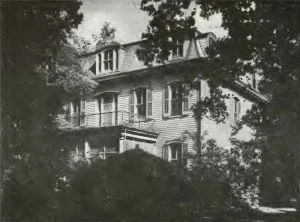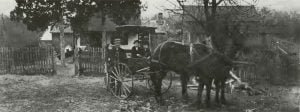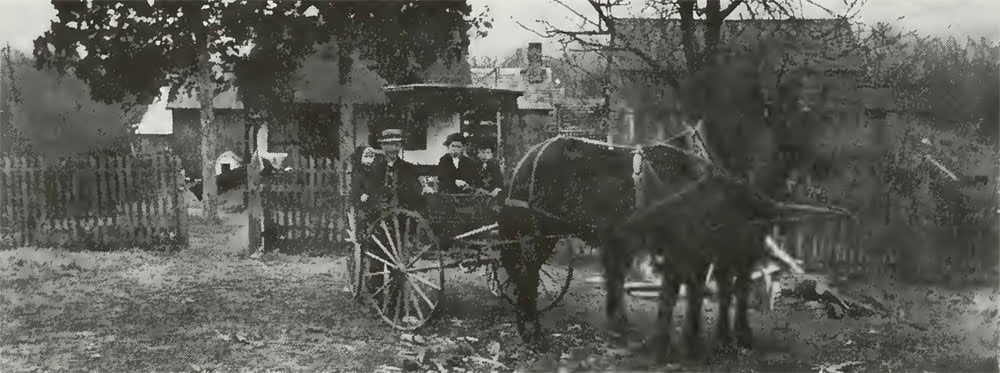Nearly every town has an old house with an interesting story. Prairie du Rocher has several, one of which was the Brickey house. Unoccupied for many years, this large three-story, square-framed house with its wide porches, stained glass, shuttered windows, and mansard roof attracted the attention of the most casual visitor to the village. It stood among large trees of a generous plot of ground below the bluff, it silently proclaimed the hospitality that once was known there. The fine iron fence that enclosed the grounds emphasized its air of detachment.
John Brickey

To know the story of this old house one must go to the Chicago of the late 1860’s and learn something of another building that Uranus H. Crosby built there in 1865. Crosby, a wealthy distiller, decided to contribute to the culture of Chicago by erecting a magnificent opera house. W. W. Boyington, a noted architect, designed a splendid structure that Crosby had constructed on the corner of Dearborn and Washington at a cost of more than $600,000 — a great sum for that day. It quickly became a showplace of the pre-fire city.
Chicago was proud of the new building. Crosby quickly learned, however that owning an opera house was expensive. In 1867, less than two years after its completion, he announced that he was broke and also expressed an intention of disposing of the opera house and 305 works of art through a nationwide lottery.
Elaborate preparations for the event were made. Some 210,000 tickets — each of them numbered and bearing a nice engraving of the opera house — were printed and offered for sale at $5.00 each.
These were sold within a few weeks, and on January 21, 1867, drawings were made in the opera house before a large and interested audience. The number drawn for the grand prize was 586000, and the owner of the winning ticket was Abraham Hagerman Lee of Prairie du Rocher.
There being no telegraph in Prairie du Rocher, a notice that Lee was the winner was sent to a law firm in St. Louis and relayed from there to Belleville. From Belleville, a messenger was dispatched on horseback to notify Mr. Lee. Before this messenger reached him, however, two men who had seen a news report of his good fortune in a St. Louis paper hastened to Prairie du Rocher to relate the good news or perhaps with hopes of doing some fast trading.

The two men found Lee reading to his sick wife. Neighbors soon heard the news and hastened to offer their congratulations. The messenger from Belleville arrived later in the evening. It is said that Mr. Lee answered the door in a long nightgown, and the messenger bowed low before him as he delivered the official notice. None of the messages, official or otherwise, seemed to disturb or excite Mr. Lee unduly. He even indicated a slight vexation and remarked, “I wish they had to swallow the opera house.” But he carefully guarded his ticket while he continued to care for his ailing wife.
A few days later, when his wife’s health had improved somewhat, Lee went to Chicago to meet Crosby, requesting at the outset that publicity be avoided. Lee indicated a willingness to sell his claim for $200,000. Crosby accepted the offer and paid that amount to Lee who quietly went back to Prairie du Rocher. Crosby once more was in full possession of the opera house, and he had profited to the extent of about $600,000 from the sale of lottery tickets.
Shortly after his return from Chicago, Lee built the residence that recently stood. Two years later he died in Cincinnati, Ohio, and the house was bought by F. W. Brickey, Lee‘s partner in the operation of the Prairie du Rocher grist and flour mill. Since that time it has been known as the Brickey House, noted for its hospitality and sociability and as a local center of culture.
Before his death, Brickey expressed a wish that if none of his children chose to make it their home, the house should be given to some charitable organization. In the event no use was made of it, Brickey asked that the home remain unoccupied or be dismantled.
The Brickey mansion long abandoned but still reflecting past glory, burned to the ground early Sunday morning, April 5th, 1970, ending a story which began with a lottery ticket more than a hundred years ago.
The fire was discovered at 2:45 a.m. when already out of control. Prairie du Rocher firemen concentrated their efforts in protecting business places across the street. Blazing sparks and debris were carried more than a block by the strong draft.
The Red Bud Fire Co. was alerted and arrived in Prairie du Rocher about 3:15 a.m. and remained on stand-by for an hour. The last of the frame structure fell about 3:45 a.m.


